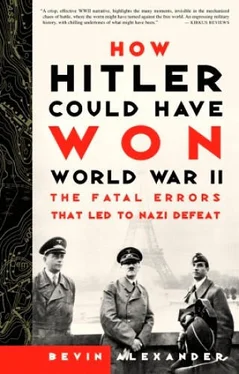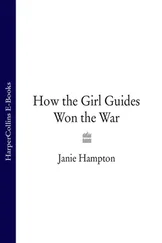The role of Italy in Allied planning shrank to that of keeping as many German forces as possible from being moved to France. The Allied commander in Italy, Sir Harold Alexander, got only the task of capturing Rome, and, later, of driving up to the Pisa-Rimini line. Therefore the terrible battles that followed in the winter and spring of 1944 had an anti-climactic air even as they were being fought.
It was well into January 1944 before 5th Army moved up to the Gustav line, which extended from the mouth of the Garigliano River on the west to Castel di Sangro in the center of the peninsula.
This barrier promised to be formidable, and the Allied commanders decided the easiest way to lever the Germans out of it and break their hold on Rome was to make an amphibious landing at Anzio, halfway between the Gustav line and Rome.
The plan was for Mark Clark’s 5th Army to launch a direct assault against the Gustav line around January 20. Once the main advance got going, the U.S. 6th Corps was to land at Anzio. The hope was that German forces would have to turn back from the Gustav line to deal with the threat, thus weakening the line and making a breakthrough easier, thereby allowing 5th Army to link up with 6th Corps.
The campaign started well enough. The British 10th Corps forced a crossing of the Garigliano near its mouth on January 17–18, 1944, and formed a strong bridgehead around the town of Minturno. But the attack on January 20 by the U.S. 2nd Corps across the Rapido River a few miles south of Cassino proved a bloody failure. The aim was to swing around to the north and seize the abbey on Monte Cassino and the town of Cassino at its base. They dominated Route 6, the main highway between Naples and Rome, axis of the Allied advance.
The two leading regiments of the U.S. 36th Infantry Division were largely destroyed by German paratroopers. An attempted assault by the British 46th Division on the immediate left also failed.
On January 22 John P. Lucas’s 6th Corps landed unopposed at Anzio (Operation Shingle). The initial forces were the U.S. 3rd and the British 1st Divisions, plus Commandos and Rangers, a parachute regiment, and two tank battalions. Lucas’s job was to reach the Alban Hills south of Rome, and cut Routes 6 and 7, over which supplies reached the Gustav line.
Kesselring hadn’t expected a lodgment at Anzio. An invasion farther north would have been much more dangerous. All he had in place was a battalion of the 29th Panzergrenadier Division, which was resting there.
But General Lucas was a cautious, pessimistic officer who moved with extreme slowness. In contrast, Kesselring reacted with great speed and skill. He told the forces on the Gustav line to stand firm, and switched the Hermann Göring Division and other elements to Anzio. Hitler, hoping a disaster at Anzio might deter a landing in France, told Kesselring he could call on all divisions in northern Italy and was sending two more divisions, plus two heavy tank battalions.
In eight days, Kesselring brought up elements of eight divisions to Anzio and set up a new army, the 14th, under Hans Georg von Mackensen, to contain it. Meanwhile Lucas—with Clark’s approval—refused to advance until he had consolidated the beachhead. This might have been a blessing. Lucas and his subordinates were so super-cautious that a quick advance inland under their leadership might have led to disaster. They would have been easy targets for a German flank attack.
The first real attempt to push inland didn’t start till January 30, and Germans already in place stopped it. The whole Anzio beachhead, only six miles deep by fifteen miles wide, was in range of German artillery, which promptly began to harass it. In addition, Luftwaffe aircraft made repeated bombing raids on the crowded Allied shipping around Anzio. Allied aircraft, operating out of the Naples area, were unable to stop these raids.
The Anzio beachhead—instead of being a lever to wrench the Germans out of the Gustav line—became a hemmed-in force in need of being rescued. As Winston Churchill commented, “I had hoped that we were hurling a wildcat onto the shore, but all we got was a stranded whale.”
Mark Clark now decided to try to break the impasse at Cassino by attacking from the north side. On January 24, the U.S. 34th Division did that, assisted by a French four-division corps under Alphonse Juin, which joined 5th Army in January. It was hard going for the Americans against the German 14th Panzer Corps under Frido von Senger und Etterlin, and they were withdrawn February 11, exhausted and depleted.
A new corps under Lieutenant General Bernard Freyberg now came up, containing the 2nd New Zealand and 4th Indian Divisions (with combined British and Indian units).
Francis Tuker, commanding 4th Indian, urged an indirect approach on Cassino through the mountains to the north, a plan favored by the French. But Freyberg rejected the proposal, and Tuker, whose division drew the job of tackling Monte Cassino, asked that the historic monastery crowning the height be neutralized by aerial bombardment. There was no evidence the Germans were using the monastery. They had not even entered it, and General Senger had evacuated the monks and works of art. But the structure was a symbolic deterrent to the Allies, and Clark and Alexander authorized the operation.
On February 15, 1944, a tremendous attack dropped 450 tons of bombs that demolished the famous monastery. The Germans now felt they could occupy the rubble. Consequently, the attack actually increased the strength of their defenses. On two successive nights 4th Indian tried in vain to seize a knoll that lay between its position and Monastery Hill. On the night of February 18 the division made a third attempt. Fighting was desperate, and all the men reaching the knoll were killed. Later that night a brigade bypassed the knoll and moved directly toward the monastery, only to encounter a concealed ravine heavily mined and covered by German machine guns. Here the brigade lost heavily and had to retreat. Meanwhile 2nd New Zealand Division crossed the Rapido just below Cassino town, but German tanks counterattacked and forced it back. The direct attack on Cassino had failed.
On the Anzio front the Germans counterattacked on February 16, and on the next two days they threatened to reach the beaches and split the bridgehead in two. The Germans were held only by the desperate defense of the British 1st and 56th and American 45th Divisions. A new attitude appeared within the bridgehead when Lucian K. Truscott arrived, first as Lucas’s deputy, then as his successor. The Germans tried once more on February 28, but Allied aircraft broke up the assaults, and on March 4 Mackensen stopped.
The Italian campaign was beginning to resemble the gruesome close-in battles on the western front in World War I, with losses just as great and gains just as minuscule.
On March 15, the Allies launched another direct attack on Cassino. The New Zealand Division was to push through the town, after which 4th Indian Division was to assault Monastery Hill. This time Cassino town was the main target. A thousand tons of bombs and 190,000 shells rained down on town and hill. As the bombers flew away and the cannon fire lifted, the infantry advanced.
“It seemed to me inconceivable,” Alexander said, “that any troops should be left alive after eight hours of such terrific hammering.” But they were. The 1st Parachute Division fought it out amid the rubble with the advancing New Zealanders. By nightfall two-thirds of the town was in Allied hands, while 4th Indian Division came down from the north and, the next day, got two-thirds of the way up Monastery Hill.
But that was the end. British tanks couldn’t negotiate the craters made by bombs and shells, the Germans filtered in reinforcements, and the weather broke in storm and rain. On March 23 Alexander halted the operation. Once more stalemate had fallen on Cassino.
Читать дальше


![Джонатан Димблби - Barbarossa - How Hitler Lost the War [calibre]](/books/385421/dzhonatan-dimblbi-barbarossa-how-hitler-lost-the-w-thumb.webp)









